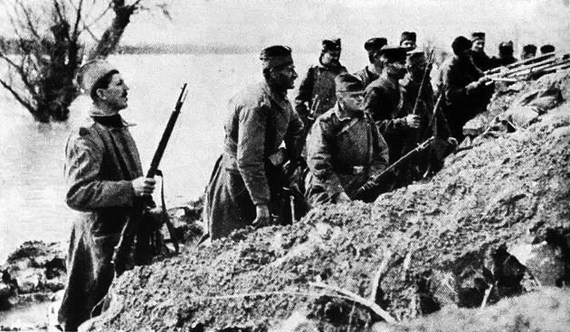
Serbian army on the Stava River, Belgrade
The Die is Cast: The Eastern Front
On July 25, two days after receiving an ultimatum from Austria, the Serbian government ordered a full mobilization of the Serbian army. On July 28, barely a month after the assassination of the Archduke and his wife, the Austrian-Hungarian Empire declared war on Serbia and ordered a partial mobilization of its army. The guns of August had started to rumble.
It could have ended there - a short nasty war that pitted a small Balkan nation against a European superpower. The sort of war that had gripped the Balkans for centuries, a few bloody battles, then a long drawn out peace conference at some stylish European capital. Perhaps a redrawing of a national boundary or two to satisfy wounded pride and Europe would have returned to enjoying an idyllic summer.
Indeed, barring any further intervention by another great power, it was hard to see how any other outcome was possible. Austria-Hungry had the third largest army in Europe and twelve times the population of Serbia. Along its frontier with Serbia it already had a 3 to 2 advantage in manpower and it had many more troops it could call up if needed.
The week that followed Austria's declaration of war against Serbia prompted a blizzard of diplomatic activity. Diplomatic cables crisscrossed the continent as foreign offices tried to head off the impending catastrophe. A few days earlier Sir Edward Grey, the British Foreign Minister, speaking on behalf of his majesty's government, implored Germany, France and Italy to act in concert with Great Britain, "four nations who had no direct interest in Serbia," for the sake of peace. On July 29, one day after the Austrian declaration, Britain once again made an urgent plea to Germany to intervene with Austria to maintain the peace.
The Russians, styling themselves the protector of the Slavic peoples, of which the Serbs were part, demanded immediate military support for Serbia. On July 29, in St. Petersburg, Tsar Nicholas II, urged on by his generals to show his resolve, ordered the full mobilization of the Russian army in all six of the military districts in western Russia. Then, hesitating, he withdrew his order and opted instead for a "partial" mobilization. In practice this meant a full mobilization in the three military districts that bordered the Austrian-Hungarian Empire and the Balkans.
In a desperate plea to the German Kaiser, his cousin, he wrote, "I shall be overwhelmed by the pressure, do what you can, your loving Nicky." The Kaiser, at the request of his government and his generals, had cut short his summer Baltic cruise and returned to Berlin. Responding to Nicholas, he replied, "I am exerting my utmost influence. Your devoted friend and cousin, Willy." Appealing to their family ties, he urged Nicholas to halt the partial mobilization of the Russian Army.
Truthfully, no one in the Russian General Staff had ever contemplated reversing a mobilization in midstream. Even if they had wanted too, they didn't know how to stop, much less reverse the process without leaving the Russian army in a state of complete disarray. Faced with mounting German pressure to stand down, on July 30 Nicholas ordered a full mobilization of the Russian Army. The same day, Germany issued an ultimatum to Russia to halt its mobilization within twelve hours or face war with Germany. The next day, August 1, citing the ongoing Russian mobilization, Germany declared war on Russia. All along the one thousand mile border shared by Russia with Germany and Austria, from the Baltic to the Balkans, the machinery of war slowly and inexorably groaned forward. On the Eastern Front, the die had now been cast.